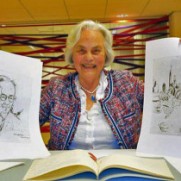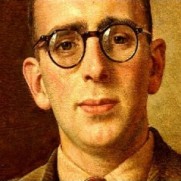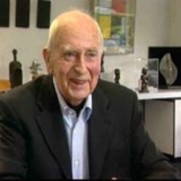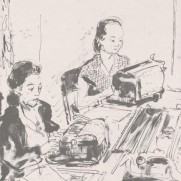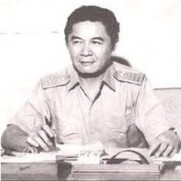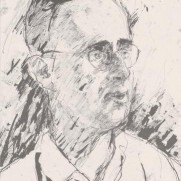07 Apr 2014
- Joty ter Kulve met de tekeningen van Henk Ngantung
- Piet Sanders (ca. 1940)
- Piet Sanders (ca. 2010)
Excellency Retno Marsudi, Mr. Berendse, dear all,
What does ‘Linggadjati’ mean to you?
+ The fact that H.E. Mrs. Retno Marsudi is present at this little ceremony today at the National Archives as the highest representative of the Republic of Indonesia.
+ The fact that from today onwards, all citizens worldwide can learn and know, because of the digitalizing of the paintings of Henk Ngantung, of the fight for freedom of the Indonesians, seen through the perspective and eyes of an Indonesian citizen.
+ The fact that Widi Widiharso is working at his thesis at Leiden University and with him thousands of Indonesian students are free to choose to study in Leiden.
+ The fact that freedom to choose, independence, one language, one country, one people and the freedom of speech exists in Indonesia.
+ The fact that the period of colonialism worldwide has had its time. The Netherlands without her colonies has been able to find new roads and the Dutch are becoming world citizens. Indonesia, after getting her independence, also has been able to find new roads and the Indonesians are becoming world citizens too.
Those days – in 1946 – the founding fathers of Indonesia and a dedicated Dutch Commission General came together in our former house in Linggadjati and for the first time in history the colonizer and colonized talked as equals. Both parties worked hard to reach an agreement and to avoid war. Diplomacy in the Bahasa Indonesia can be translated by the term ‘Mushawara’. It means deliberate as long as it takes to reach consensus. ‘Mushawara’ is a main element in the national character of Indonesia.
The Dutch secretary of the delegation – Piet Sanders – understood ‘mushawara’ , not only by wits, also by soul. To Piet Sanders a diplomatic solution was the only way out and together with his Indonesian counterpart, Ali Boediardjo, he did his utmost to avoid war. Both believed fullheartedly that an agreement was the only fair solution for both nations and they became friends for life.
When Sanders, back in the Netherlands, learned that his government – despite the Linggadjati Agreement – chose the way of violence, he resigned from his duties as Secretary General. Reviled in the Netherlands he took on a career as international arbiter in colonial conflicts. He also started to collect art. Henk Ngantung, the Indonesian artist that was present during the negotiations in Linggadjati, honored Piet Sanders by giving him the sketches that he made those days. And just before Sanders died, he handed them over to me.
- Typists at work in Linggadjati – drawing by Henk Ngantung
- Henk Ngantung
- Piet Sanders – drawing by Henk Ngantung
These sketches not only tell the story of Piet Sanders, but also the missed opportunity of the Kingdom of the Netherlands to end the colonial times peacefully.
Prof. Sanders somewhere from his little place in the Universe whispers to me: ‘Well done old lady, the National Archives are the right place for the litho’s, well done and thank the National Achieves Mr. Berendse for their vision”.




